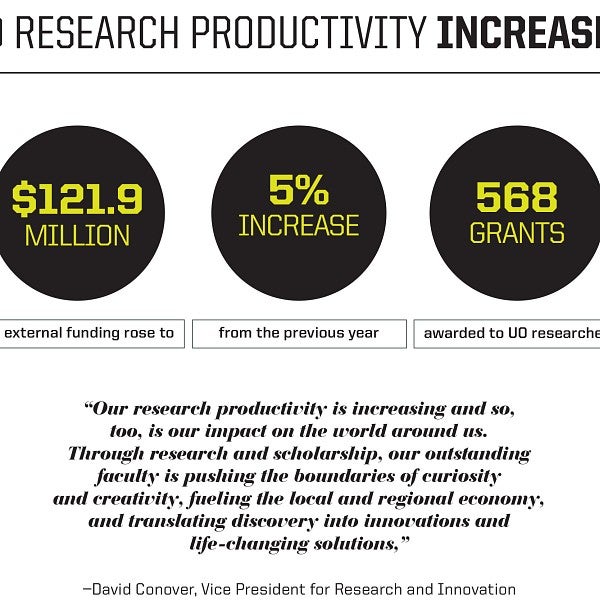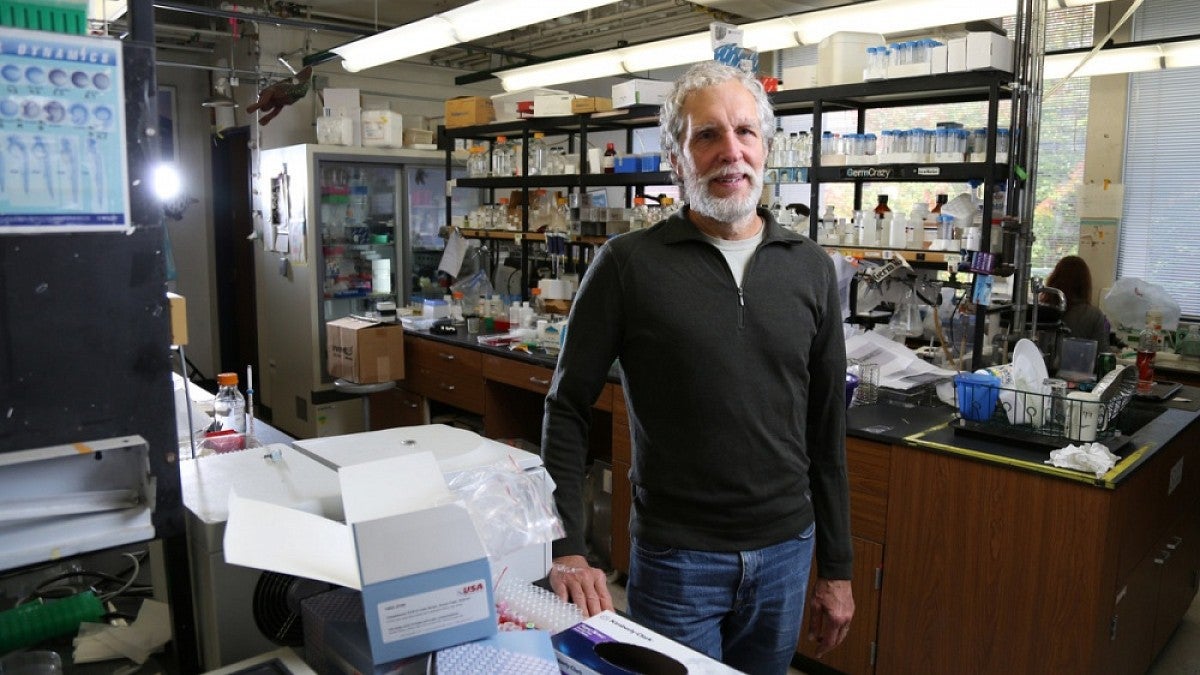In June, biologist Monte Westerfield secured a five-year, $9.6 million grant from the National Institutes of Health to the UO’s Zebrafish International Resource Center.
The award — which will help expand the UO’s zebrafish repository for the benefit of the international research community — was one of 568 grants awarded to UO researchers, closing out a successful fiscal year in which investigators brought in an estimated $121.9 million in grants, contracts and competitive awards, an increase of more than 5 percent from the previous year.
UO’s research expenditures, which represent the university’s spending of research dollars received in the past, went up by 7.4 percent to $117.3 million, according to preliminary numbers from the research office.

Conover, the UO’s chief research officer, pointed to recent hiring initiatives as one reason for the bump in research activity. These include the UO’s Cluster Hire Initiative and President Michael Schill’s investment in hiring more research faculty members and retaining existing faculty members.
Conover also credited the hard work of UO researchers in applying for grants in a highly competitive funding environment. Federal research funding has been largely flat in recent years, and UO researchers increasingly have been seeking funding from nonfederal sources, including industries, foundations and associations.
All told, UO researchers submitted 1,065 proposals during the 2018 fiscal year ending June 30, an increase of 10 percent from the previous year. The 568 awards that were received represented a 1 percent increase from the previous year.
Examples of new 2018 awards spanning the UO’s many departments and institutes include:
- A $3.3 million grant to Beth Stormshak, a professor in the Department of Counseling Psychology, and the Prevention Science Institute from the U.S. Department of Education to examine family-centered interventions in schools to reduce social and behavioral problems.
- A $600,000 grant to Stephanie LeMenager, who holds the Moore Endowed Chair in the Department of English, and the Center for Environmental Futures from the Andrew W. Mellon Foundation to strengthen the academic humanities, expand interdisciplinary partnerships and deepen the center’s commitment to environmental work, justice and sustainability.
- A $750,000 grant to Dejing Dou, a professor in the UO’s Department of Computer and Information Science, creating the Center for Big Learning, which combines artificial intelligence, big data and large-scale “deep learning.”
- A $2 million grant to James Brau, a professor in the Department of Physics, and the Center for High Energy Physics funding a three-year research program involving the UO’s experimental high-energy physics group.
- A $1.5 million grant to Kryn Stankunas, a professor in the Department of Biology and the Institute of Molecular Biology, from the National Institutes of Health to study how zebrafish organs perfectly regenerate to their original size and shape.
- An $888,000 grant to Kevin Van Den Wymelenberg, a professor in the Department of Architecture and the director of the Energy Studies in Buildings Laboratory, from the Oregon State University College of Forestry and the U.S. Department of Agriculture to study microbial diversity in mass-timber buildings
For a rundown of all of the awards received in 2018, visit the UO’s monthly award reports page.
UO’s innovation metrics also bumped up in the last fiscal year, according to the UO’s Innovation Partnership Services unit, which works with UO innovators, the public and industry to accelerate the adoption of products derived from UO research and education.
“We’ve had great success in translating UO research into products that generate economic activity and societal impact,” said Chuck Williams, associate vice president for innovation. “UO research innovations are spun out into existing and new companies that provide products and services that stimulate the Oregon and national economy.”
UO research gave rise to two early-stage startup companies in last year: The firm Rhithwir is working on a full-immersion virtual and augmented reality system with applications for gaming, sports and military and first-responder training. Rhithwir is a graduate of RAIN Eugene’s fall 2017 cohort. The company Journalistic Ventures Corporation is engaged in a public-private partnership with the UO’s School of Journalism and Communication to develop and deliver a journalism curriculum for schools that is anchored in student-driven learning, an approach that allows young people to take ownership of their education by creating and publishing peer-directed media projects.
Other UO innovation metrics from the past year include:
- Disclosures — inventions, copyrighted works, biological materials, software and related trademarks — jumped from 28 to 42.
- Science-based invention disclosures jumped from 10 to 18.
- Investment in intellectual property rights — filing patents on inventions, registering for federal trademarks and registering copyrights — rose by 58 percent.
- Patent filings increased from 8 to 17.
- UO is now ranked No. 5 in the Association of American Universities in licensing per research dollar and No. 30 in patents per research dollar.
- UO received $9 million in licensing income, of which 89 percent was reinvested into academic units, distributed to UO innovators and returned to the state.
Williams also pointed to an increase in agreements between UO researchers for the exchange of proprietary materials such as data, software and research materials.
“We are experiencing a significant rise in data-sharing agreements,” Williams said. “We anticipate even more as UO’s big data initiative and the Phil and Penny Knight Campus for Accelerating Scientific Impact come online.”
By Lewis Taylor, University Communications


